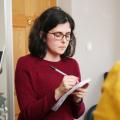
An Ashdon resident has helped raise funds for a charity which just sent its sixth convoy to Ukraine.
Convoy4Ukraine is a community-run organisation which works to provide urgent relief and support to Ukrainian communities affected by the war.
Volunteers drive 4x4 vehicles packed with humanitarian aid for those in need. The most recent convoy set out last week.
Karen Tookey-Ainge, who lives in Ashdon and works as a senior procurement manager at the University of Cambridge's Estates Division, uses her specialist skills to source good quality 4x4s and ambulances for Convoy4Ukraine's partners in Ukraine.
She said: "We have managed to source an excellent fleet of good quality vehicles for our sixth convoy to Ukraine this year.
"I am often struck by the immense generosity of spirit that people show when I tell them why I am sourcing used vehicles – they often pass the vehicles on to us at cost price or offer to help with fundraising."
Earlier this month a meeting was held where members of Convoy4Ukraine discussed plans for last week's convoy.

All vehicles are safety checked and have MOTs and full servicing before their journey across Europe.
On the weekend of September 14 and 15, prior to the convoy's departure, a group of volunteers drove two of the pick-up trucks to the Ukrainian School in Cambridge.
Children at the school gave gifts and messages of support for the volunteer drivers making the long journey to Ukraine.
Donations can be made at https://www.convoy4ukraine.com/donate.
READ MORE
- Mammoth hugs at Saffron Walden Museum's new interactive display
- Independent review published into North West Essex postal vote delay issues
At the end of their journey, the vehicles drive about 10 miles into western Ukraine, complete the handover and return to Poland the same day - staying a long way away from the frontline.
The humanitarian aid is requested by the charity's partners - The Sunflower Network - and incudes personal hygiene items, dried food, tea, coffee, baby formula, electronics such as batteries, head torches and power banks, sleeping bags and warm socks.
They also take donations of hospital-level medical equipment.



Comments: Our rules
We want our comments to be a lively and valuable part of our community - a place where readers can debate and engage with the most important local issues. The ability to comment on our stories is a privilege, not a right, however, and that privilege may be withdrawn if it is abused or misused.
Please report any comments that break our rules.
Read the rules here